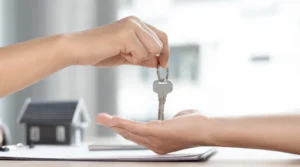Tips for those looking to buy a house to rent
Did you know you need a 15% to 25% down payment for an investment property? This is much more than the 3% for a primary home.
Annonces
Despite the higher cost, rental property can give a good return on investment (ROI). For example, a 6% return in the first year is quite appealing, better than stocks and bonds.
Before jumping into real estate, know what being a landlord means. Look into rent prices to guess your income.
Don’t forget to include costs like maintenance, taxes, and management fees to figure out your ROI. Experts say set aside at least 1% of the property’s yearly value for upkeep and repairs.
Understand the Responsibilities of Being a Landlord

Annonces
Tips for those looking to buy a house to rent
Being a landlord means you have many duties to keep your rental property in good shape and make sure your tenants are happy.
One key job is property maintenance. Laws say you must fix critical issues in three to seven days and less serious ones within 30 days.
This covers fixing damage from natural disasters and big home system problems like plumbing and electrical issues.
Building good tenant relationships is also vital. The Fair Housing Act stops landlords from treating tenants unfairly because of their race, color, or other things.
By talking openly with tenants and solving their problems quickly, you can make a better living space for everyone.
“Landlords are legally obligated to provide proper notice before entering a property, with statutes often specifying at least 24-hour notice.”
It’s important to know the rental laws in your area. Most places say you must give tenants 30 days’ notice to end a month-to-month lease.
Oregon made history in 2019 by starting rent control, limiting how landlords can evict tenants. California also passed a law in 2019 to control rent increases in areas without rent laws.
Your duties can change based on the property you own. Houses with lawns need more work on the yard than apartments.
But, managing an apartment building means dealing with more tenants and upkeep. Some landlords, like city governments, manage affordable housing based on how much people earn.
+ 4 conseils pour éviter les arnaques en ligne : protégez votre téléphone portable !
Consider the Pros and Cons of Buying Rental Property
Thinking about buying rental property means looking at both the good and the bad. On the plus side, it can give you a steady flow of income.
This lets you make money even while you work your main job. Plus, as property values go up, your investment could grow, boosting your wealth.
Real estate is often seen as a solid investment compared to other choices.
There are also tax benefits to owning rental property. Thanks to the 2017 Tax Cuts and Jobs Act, you can deduct 20% of your rental income if your income is below certain limits.
You can deduct things like insurance, mortgage interest, upkeep costs, and wear and tear. Plus, a 1031 exchange lets you sell a property and buy another without paying taxes on the gain.
“Real estate cannot be lost or stolen, nor can it be carried away. Purchased with common sense, paid for in full, and managed with reasonable care, it is about the safest investment in the world.” – Franklin D. Roosevelt
But, being a landlord isn’t all easy. Dealing with tough tenants is a big challenge, with problems like late rent, damage, or high demands.
You’ll also have to handle upkeep and repairs, which can be expensive. For example, a new roof might set you back $12,000.
And, you’ll need to keep up with mortgage, tax, and insurance payments, which might go up faster than your rental income.
Getting a loan for a rental property often means putting down a bigger amount than for a home you live in. Real estate isn’t easy to sell quickly, even in a strong market.
A decline in the neighborhood could also lower its appeal and value over time. Lastly, changes in tax laws can affect the perks of owning rental property, so it’s important to keep up with these changes.
Financing Your Rental Property Purchase

Tips for those looking to buy a house to rent
Investing in rental properties requires the right financing. Most investors choose to finance their properties with mortgages.
This way, they can use their money more effectively. Unlike buying a primary home, investment property loans need a bigger down payment, usually 15% to 25%, based on the loan type.
Getting preapproved for a mortgage is key to success. Lenders check your credit score, debt-to-income ratio (DTI), and cash reserves. They look for a credit score of at least 620 and a DTI under 45%.
Also, you should have enough cash for 3-6 months of expenses.
Recent data shows conventional loans for rental properties might need a 30% down payment. A credit score of 629 or higher is advised for approval.
There are many loan types for rental properties, like conventional, FHA, VA, and portfolio loans. FHA loans can be used for properties with two to four units.
You must live in one unit for a year, and down payments start at 3.5% for scores of 580 or higher. VA loans are for military folks and let you buy properties with up to seven units, as long as you live in one.
Other financing choices include home equity loans, HELOCs, cash-out refinancing, and hard money loans. These options let investors use their home equity or get short-term loans for buying properties and doing renovations.
But remember, mortgage rates for investment properties are usually 0.5 to 0.875 percentage points higher than for primary homes.
When you apply for financing, be ready to show proof of rental income. This includes current leases, rent history, and tax returns.
Some loans let you count rental income as part of your income. Lenders might also ask for mortgage reserves, which could be two to six months of payments.
+ Investing in Supermarkets: Strategies for Market Sustainability and Efficient Management
Choose the Right Location for Your Rental Property
When picking a spot for your rental property, think about safety, amenities, demand, and growth potential.
A great location draws in good tenants and keeps your income steady. Aim for places with low crime, excellent schools, public transport, and easy access to shops, parks, and eateries.
Check out the local rental market to see if there’s a demand for properties in the area. Cities like Dallas are good choices because they’re growing and have strong job markets.
With a median rent of $1,787 per month and a 4.07% rent growth over the last year, Dallas is a solid option. Plus, its 10-year equity growth of 115.52% shows it’s a good place for property investments.
Real estate is now Americans’ favorite long-term investment, with consistently high rankings since 2012, according to a Bankrate study in 2022.
Remember, the best spots for growth might not always have the highest cash flow at first. But, investing in areas like Dallas, with its 8.91% 1-year equity growth, can be rewarding over time, even if your cash flow is lower at the start.
When looking at a rental property, use a rent estimate report to see if the rent covers costs and leaves you with profit.
Tools like RentSpree give you up-to-date rental and vacancy rate estimates. Setting rent too high can leave properties empty, while setting it too low means you might have to cover rental costs yourself.
Tips for Making Your Rental Property Profitable
To make your rental property profitable, screen tenants carefully. Look for renters who pay on time and take good care of the property. Renewing leases yearly helps keep tenants stable and allows for rent increases.
There are over 80 million single-family homes in the U.S. This type of property is a popular choice for investors.
Plan to spend about $1,000 a year on maintenance for every 1,000 square feet of property. That’s around $1 per square foot each year.
Set aside 20% to 30% of your rental income for upkeep, repairs, and emergencies. This helps you be ready for unexpected costs.
Diversifying your properties can make your rental income more stable and predictable. Vacancies can be a big financial risk for landlords.
Consider hiring a property manager to manage your property. They can handle tenant issues, maintenance, and collecting rent.
This service usually costs 8% to 12% of your rental income.
For a successful rental property, aim for a 10% return on your investment. Your cash flow might be lower at first, but it should get better as you pay off your mortgage and raise rents.
Start with the local average rent and adjust it to cover your mortgage, taxes, and other costs.
By using these strategies and looking at the long term, you can boost your chances of making a profitable rental property investment.
Risks and Rewards of Rental Property Investing
Investing in rental properties can bring big rewards and some risks. You can earn a steady income from rent.
Over time, the value of your property might go up, especially in areas that are in high demand. Plus, the rent you get isn’t taxed like regular income, and you might be able to deduct the interest on your loan.
But, it’s key to know the risks too. Maintenance and management costs can add up, averaging $6,409 a year in 2023.
Sometimes, your rent might not be enough to cover your mortgage, especially if rent prices don’t go up. Make sure you have enough cash saved for these costs.
Single-family homes in the rental market show average annual returns comparable to the stock market, with less volatility.
Real estate isn’t easy to sell quickly and can be costly to buy and sell. If a tenant leaves, you’ll still have to pay for the property.
To lessen these risks, pick properties that are under 15 years old to cut down on maintenance. Choosing the right tenants with tools like TransUnion SmartMove can also help keep them longer.
Knowing the local market is key to doing well in real estate. Places with high vacancy rates might not be good for rental investments.
If landlords offer extra incentives, it could mean there’s a lot of competition. Spreading out your rental properties can help protect you from economic downturns in certain areas.
Conclusion
Investing in rental property can be a smart way to earn passive income and grow your wealth. The median rent in June 2024 was $305 higher than in 2019.
The median home sales price in the U.S. hit $420,800 in the first quarter of 2024. This shows the potential for profit is clear.
But, it’s important to know the duties and risks of being a landlord before you start. Buying a house to rent means a big upfront cost, often 20% of the home’s value.
Mortgage payments might be lower than rent in some areas, but remember to factor in extra costs like insurance, property taxes, and maintenance.
Homeowners’ insurance can be up to eight times more expensive than renters’ insurance. You also have to pay property taxes directly, and not paying can lead to foreclosure.
Yet, homeowners can deduct interest payments and gain equity as property values go up, which renters can’t.
Before deciding to invest in rental property, think about your finances, the market, and your future plans.
Doing your homework, planning your finances, and picking the right property can increase your chances of success.
Whether you manage the property yourself or hire a manager, investing in rental property takes a lot of time and money.
By considering the pros and cons and following best practices, you can create a profitable portfolio. This way, you can reach your financial goals through passive income from your investment property.
